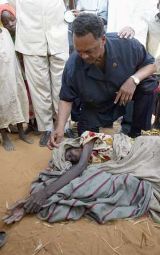Jesse Jackson visits Sudan , urges end to Darfur crisis
DOW JONES NEWSWIRES
AL-FASHER, Sudan, Aug 27, 2004 (AP) — U.S. civil rights activist the Rev. Jesse Jackson visited the conflict torn region of Darfur Friday, urging the Sudanese government and African rebels to end the crisis that has killed thousands of villagers and driven more than a million from their homes.
 Arriving in the provincial capital of North Darfur in an aircraft lent by Libyan leader Moammar Gadhafi, Jackson said he wanted to “observe first hand what we have heard through testimony and what we have read.”
Arriving in the provincial capital of North Darfur in an aircraft lent by Libyan leader Moammar Gadhafi, Jackson said he wanted to “observe first hand what we have heard through testimony and what we have read.”
“It is obvious there is a great humanitarian crisis,” Jackson told The Associated Press after landing at an airport in the North Darfur capital of Al-Fasher, where he was met by a delegation of tribal leaders and officials.
“We call for collective action soon to stop the violence and open up the roads for relief and that requires a worldwide effort,” said Jackson, who wore a black baseball cap bearing the logo “Unite.”
“Timing is of the essence as people are dying every day.”
Jackson, a former U.S. presidential candidate, called on U.S. President George W. Bush and Democratic candidate John Kerry to concentrate their efforts on helping the people of Darfur.
He planned to tour the Abu Shouk camp on the outskirts of Al-Fasher, which is home to more than 43,000 displaced people. His visit comes as an Aug. 30 deadline set by the U.N. Security Council nears, calling on the Sudanese government to disarm Arab militiamen blamed for the Darfur violence or face possible diplomatic or economic penalties.
The U.N. describes the situation in Darfur as the world’s worst humanitarian crisis and says more than 30,000 people have been killed and 1.4 million displaced in an 18-month conflict. The violence began after two African rebel factions rose against the government, claiming discrimination in the distribution of scarce resources in the arid western region.
Since then, Arab militias called the Janjaweed have gone on a rampage, destroying villages, killing and pillaging across Darfur, a region the size of France.
The U.S. Congress and U.N. officials accuse Khartoum of backing the militia in a scorched earth campaign to suppress the revolt – an allegation it strongly denies.
Jackson has appealed to Gadhafi to help solve the problem in Darfur.
Meanwhile a team of U.N. officials spent a second day visiting camps and villages across the region’s three provinces, to verify what progress Khartoum had made in improving security and humanitarian access.
Sudanese Interior Minister Abdul Raheem Mohammed Hussein told The Associated Press his government had arrested an unspecified number of Janjaweed, stressing they were outlaws.
“Many are arrested,” he said, as he took breakfast with tribal leaders at the provincial governor’s residence in Al-Fasher. “A lot of them have been sentenced, some of them to death, some of them to cut off their hands.”
He stressed that the government was “downsizing” the Popular Defense Force, a Sudanese government paramilitary group.
“We are now downsizing the PDF by 30%,” he said in an exclusive interview with the AP. “They are handing in their weapons.”
Sudan signed a joint action plan with the U.N. Aug. 10 to create havens in Darfur within 30 days so civilians can search for food and water and farm without fear of attack.
The plan also requires an end to government military operations and rebel groups in areas around camps and towns and villages that still have large populations.
“We have made good progress,” said Hussein. “They now think security in the camps is quite good. The only thing we are now discussing is security outside the camps and how far the security will extend.”
Secretary-General Kofi Annan is expected to deliver a written report on Sudan ‘s compliance by Aug. 31 and the Security Council is scheduled to meet Sept. 2.
